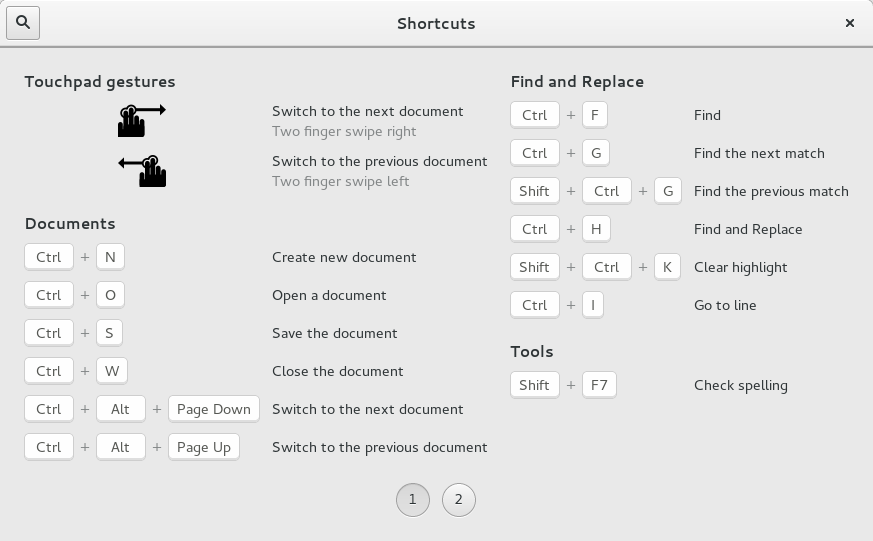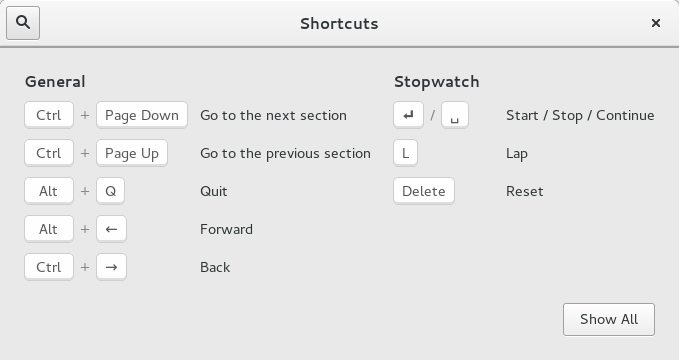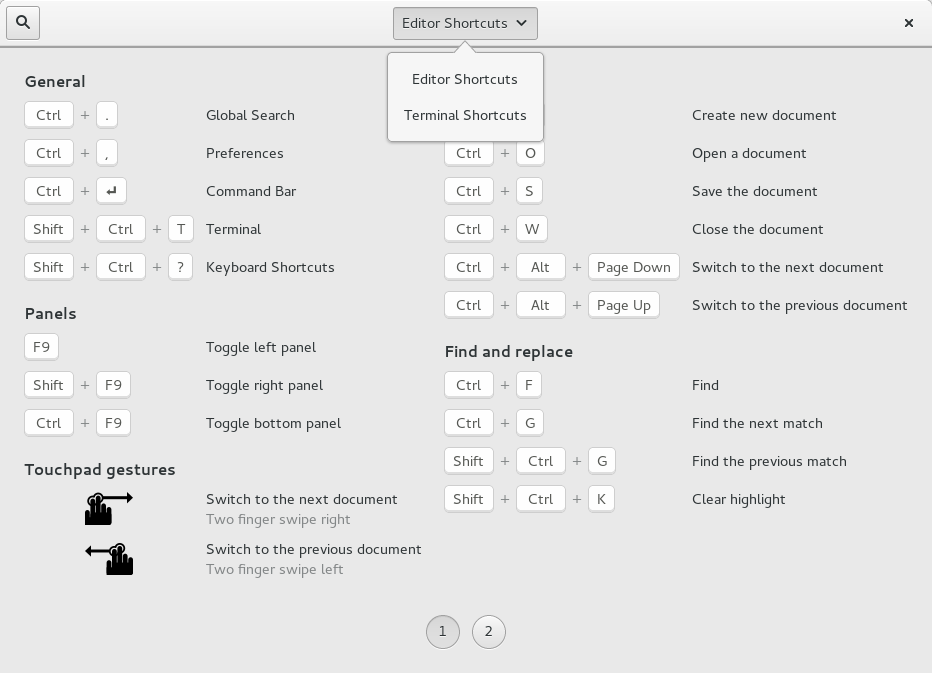Struct gtk4::ShortcutsWindow
source · #[repr(transparent)]pub struct ShortcutsWindow { /* private fields */ }Expand description
A ShortcutsWindow shows information about the keyboard shortcuts
and gestures of an application.
The shortcuts can be grouped, and you can have multiple sections in this window, corresponding to the major modes of your application.
Additionally, the shortcuts can be filtered by the current view, to avoid showing information that is not relevant in the current application context.
The recommended way to construct a ShortcutsWindow is with
Builder, by populating a ShortcutsWindow with one or
more ShortcutsSection objects, which contain GtkShortcutsGroups
that in turn contain objects of class ShortcutsShortcut.
A simple example:

This example has as single section. As you can see, the shortcut groups are arranged in columns, and spread across several pages if there are too many to find on a single page.
The .ui file for this example can be found here.
An example with multiple views:

This example shows a ShortcutsWindow that has been configured to show only
the shortcuts relevant to the “stopwatch” view.
The .ui file for this example can be found here.
An example with multiple sections:

This example shows a ShortcutsWindow with two sections, “Editor Shortcuts”
and “Terminal Shortcuts”.
The .ui file for this example can be found here.
Implements
GtkWindowExt, WidgetExt, glib::ObjectExt, AccessibleExt, BuildableExt, ConstraintTargetExt, NativeExt, RootExt, ShortcutManagerExt, WidgetExtManual, AccessibleExtManual
Implementations§
source§impl ShortcutsWindow
impl ShortcutsWindow
sourcepub fn builder() -> ShortcutsWindowBuilder
pub fn builder() -> ShortcutsWindowBuilder
Creates a new builder-pattern struct instance to construct ShortcutsWindow objects.
This method returns an instance of ShortcutsWindowBuilder which can be used to create ShortcutsWindow objects.
sourcepub fn section_name(&self) -> Option<GString>
pub fn section_name(&self) -> Option<GString>
The name of the section to show.
This should be the section-name of one of the ShortcutsSection
objects that are in this shortcuts window.
sourcepub fn set_section_name(&self, section_name: Option<&str>)
pub fn set_section_name(&self, section_name: Option<&str>)
The name of the section to show.
This should be the section-name of one of the ShortcutsSection
objects that are in this shortcuts window.
sourcepub fn view_name(&self) -> Option<GString>
pub fn view_name(&self) -> Option<GString>
The view name by which to filter the contents.
This should correspond to the property::ShortcutsGroup::view
property of some of the ShortcutsGroup objects that
are inside this shortcuts window.
Set this to None to show all groups.
sourcepub fn set_view_name(&self, view_name: Option<&str>)
pub fn set_view_name(&self, view_name: Option<&str>)
The view name by which to filter the contents.
This should correspond to the property::ShortcutsGroup::view
property of some of the ShortcutsGroup objects that
are inside this shortcuts window.
Set this to None to show all groups.
sourcepub fn connect_close<F: Fn(&Self) + 'static>(&self, f: F) -> SignalHandlerId
pub fn connect_close<F: Fn(&Self) + 'static>(&self, f: F) -> SignalHandlerId
Emitted when the user uses a keybinding to close the window.
This is a keybinding signal.
The default binding for this signal is the Escape key.
pub fn emit_close(&self)
sourcepub fn connect_search<F: Fn(&Self) + 'static>(&self, f: F) -> SignalHandlerId
pub fn connect_search<F: Fn(&Self) + 'static>(&self, f: F) -> SignalHandlerId
Emitted when the user uses a keybinding to start a search.
This is a keybinding signal.
The default binding for this signal is Control-F.
pub fn emit_search(&self)
pub fn connect_section_name_notify<F: Fn(&Self) + 'static>(
&self,
f: F
) -> SignalHandlerId
pub fn connect_view_name_notify<F: Fn(&Self) + 'static>(
&self,
f: F
) -> SignalHandlerId
Trait Implementations§
source§impl Clone for ShortcutsWindow
impl Clone for ShortcutsWindow
source§impl Debug for ShortcutsWindow
impl Debug for ShortcutsWindow
source§impl Display for ShortcutsWindow
impl Display for ShortcutsWindow
source§impl Hash for ShortcutsWindow
impl Hash for ShortcutsWindow
source§impl Ord for ShortcutsWindow
impl Ord for ShortcutsWindow
source§impl ParentClassIs for ShortcutsWindow
impl ParentClassIs for ShortcutsWindow
source§impl<OT: ObjectType> PartialEq<OT> for ShortcutsWindow
impl<OT: ObjectType> PartialEq<OT> for ShortcutsWindow
source§impl<OT: ObjectType> PartialOrd<OT> for ShortcutsWindow
impl<OT: ObjectType> PartialOrd<OT> for ShortcutsWindow
1.0.0 · source§fn le(&self, other: &Rhs) -> bool
fn le(&self, other: &Rhs) -> bool
self and other) and is used by the <=
operator. Read moresource§impl StaticType for ShortcutsWindow
impl StaticType for ShortcutsWindow
source§fn static_type() -> Type
fn static_type() -> Type
Self.impl Eq for ShortcutsWindow
impl IsA<Accessible> for ShortcutsWindow
impl IsA<Buildable> for ShortcutsWindow
impl IsA<ConstraintTarget> for ShortcutsWindow
impl IsA<Native> for ShortcutsWindow
impl IsA<Root> for ShortcutsWindow
impl IsA<ShortcutManager> for ShortcutsWindow
impl IsA<Widget> for ShortcutsWindow
impl IsA<Window> for ShortcutsWindow
Auto Trait Implementations§
impl RefUnwindSafe for ShortcutsWindow
impl !Send for ShortcutsWindow
impl !Sync for ShortcutsWindow
impl Unpin for ShortcutsWindow
impl UnwindSafe for ShortcutsWindow
Blanket Implementations§
source§impl<O> AccessibleExtManual for Owhere
O: IsA<Accessible>,
impl<O> AccessibleExtManual for Owhere
O: IsA<Accessible>,
source§fn update_property(&self, properties: &[Property<'_>])
fn update_property(&self, properties: &[Property<'_>])
source§fn update_relation(&self, relations: &[Relation<'_>])
fn update_relation(&self, relations: &[Relation<'_>])
source§fn update_state(&self, states: &[State])
fn update_state(&self, states: &[State])
source§impl<T> Cast for Twhere
T: ObjectType,
impl<T> Cast for Twhere
T: ObjectType,
source§fn upcast<T>(self) -> Twhere
T: ObjectType,
Self: IsA<T>,
fn upcast<T>(self) -> Twhere
T: ObjectType,
Self: IsA<T>,
T. Read moresource§fn upcast_ref<T>(&self) -> &Twhere
T: ObjectType,
Self: IsA<T>,
fn upcast_ref<T>(&self) -> &Twhere
T: ObjectType,
Self: IsA<T>,
T. Read moresource§fn downcast<T>(self) -> Result<T, Self>where
T: ObjectType,
Self: CanDowncast<T>,
fn downcast<T>(self) -> Result<T, Self>where
T: ObjectType,
Self: CanDowncast<T>,
T. Read moresource§fn downcast_ref<T>(&self) -> Option<&T>where
T: ObjectType,
Self: CanDowncast<T>,
fn downcast_ref<T>(&self) -> Option<&T>where
T: ObjectType,
Self: CanDowncast<T>,
T. Read moresource§fn dynamic_cast<T>(self) -> Result<T, Self>where
T: ObjectType,
fn dynamic_cast<T>(self) -> Result<T, Self>where
T: ObjectType,
T. This handles upcasting, downcasting
and casting between interface and interface implementors. All checks are performed at
runtime, while downcast and upcast will do many checks at compile-time already. Read moresource§fn dynamic_cast_ref<T>(&self) -> Option<&T>where
T: ObjectType,
fn dynamic_cast_ref<T>(&self) -> Option<&T>where
T: ObjectType,
T. This handles upcasting, downcasting
and casting between interface and interface implementors. All checks are performed at
runtime, while downcast and upcast will do many checks at compile-time already. Read moresource§unsafe fn unsafe_cast<T>(self) -> Twhere
T: ObjectType,
unsafe fn unsafe_cast<T>(self) -> Twhere
T: ObjectType,
T unconditionally. Read moresource§unsafe fn unsafe_cast_ref<T>(&self) -> &Twhere
T: ObjectType,
unsafe fn unsafe_cast_ref<T>(&self) -> &Twhere
T: ObjectType,
&T unconditionally. Read moresource§impl<U> IsSubclassableExt for Uwhere
U: IsClass + ParentClassIs,
impl<U> IsSubclassableExt for Uwhere
U: IsClass + ParentClassIs,
fn parent_class_init<T>(class: &mut Class<U>)where
T: ObjectSubclass,
<U as ParentClassIs>::Parent: IsSubclassable<T>,
fn parent_instance_init<T>(instance: &mut InitializingObject<T>)where
T: ObjectSubclass,
<U as ParentClassIs>::Parent: IsSubclassable<T>,
source§impl<T> ObjectExt for Twhere
T: ObjectType,
impl<T> ObjectExt for Twhere
T: ObjectType,
source§fn is<U>(&self) -> boolwhere
U: StaticType,
fn is<U>(&self) -> boolwhere
U: StaticType,
true if the object is an instance of (can be cast to) T.source§fn object_class(&self) -> &Class<Object>
fn object_class(&self) -> &Class<Object>
ObjectClass of the object. Read moresource§fn class_of<U>(&self) -> Option<&Class<U>>where
U: IsClass,
fn class_of<U>(&self) -> Option<&Class<U>>where
U: IsClass,
T. Read moresource§fn interface<U>(&self) -> Option<InterfaceRef<'_, U>>where
U: IsInterface,
fn interface<U>(&self) -> Option<InterfaceRef<'_, U>>where
U: IsInterface,
T of the object. Read moresource§fn set_property<V>(&self, property_name: &str, value: V)where
V: ToValue,
fn set_property<V>(&self, property_name: &str, value: V)where
V: ToValue,
source§fn set_property_from_value(&self, property_name: &str, value: &Value)
fn set_property_from_value(&self, property_name: &str, value: &Value)
source§fn set_properties(&self, property_values: &[(&str, &dyn ToValue)])
fn set_properties(&self, property_values: &[(&str, &dyn ToValue)])
source§fn set_properties_from_value(&self, property_values: &[(&str, Value)])
fn set_properties_from_value(&self, property_values: &[(&str, Value)])
source§fn property<V>(&self, property_name: &str) -> Vwhere
V: 'static + for<'b> FromValue<'b>,
fn property<V>(&self, property_name: &str) -> Vwhere
V: 'static + for<'b> FromValue<'b>,
property_name of the object and cast it to the type V. Read moresource§fn property_value(&self, property_name: &str) -> Value
fn property_value(&self, property_name: &str) -> Value
property_name of the object. Read moresource§fn property_type(&self, property_name: &str) -> Option<Type>
fn property_type(&self, property_name: &str) -> Option<Type>
property_name of this object. Read moresource§fn find_property(&self, property_name: &str) -> Option<ParamSpec>
fn find_property(&self, property_name: &str) -> Option<ParamSpec>
ParamSpec of the property property_name of this object.source§fn list_properties(&self) -> PtrSlice<ParamSpec>
fn list_properties(&self) -> PtrSlice<ParamSpec>
ParamSpec of the properties of this object.source§fn freeze_notify(&self) -> PropertyNotificationFreezeGuard
fn freeze_notify(&self) -> PropertyNotificationFreezeGuard
source§unsafe fn set_qdata<QD>(&self, key: Quark, value: QD)where
QD: 'static,
unsafe fn set_qdata<QD>(&self, key: Quark, value: QD)where
QD: 'static,
key. Read moresource§unsafe fn qdata<QD>(&self, key: Quark) -> Option<NonNull<QD>>where
QD: 'static,
unsafe fn qdata<QD>(&self, key: Quark) -> Option<NonNull<QD>>where
QD: 'static,
key. Read moresource§unsafe fn steal_qdata<QD>(&self, key: Quark) -> Option<QD>where
QD: 'static,
unsafe fn steal_qdata<QD>(&self, key: Quark) -> Option<QD>where
QD: 'static,
key. Read moresource§unsafe fn set_data<QD>(&self, key: &str, value: QD)where
QD: 'static,
unsafe fn set_data<QD>(&self, key: &str, value: QD)where
QD: 'static,
key. Read moresource§unsafe fn data<QD>(&self, key: &str) -> Option<NonNull<QD>>where
QD: 'static,
unsafe fn data<QD>(&self, key: &str) -> Option<NonNull<QD>>where
QD: 'static,
key. Read moresource§unsafe fn steal_data<QD>(&self, key: &str) -> Option<QD>where
QD: 'static,
unsafe fn steal_data<QD>(&self, key: &str) -> Option<QD>where
QD: 'static,
key. Read moresource§fn block_signal(&self, handler_id: &SignalHandlerId)
fn block_signal(&self, handler_id: &SignalHandlerId)
source§fn unblock_signal(&self, handler_id: &SignalHandlerId)
fn unblock_signal(&self, handler_id: &SignalHandlerId)
source§fn stop_signal_emission(&self, signal_id: SignalId, detail: Option<Quark>)
fn stop_signal_emission(&self, signal_id: SignalId, detail: Option<Quark>)
source§fn stop_signal_emission_by_name(&self, signal_name: &str)
fn stop_signal_emission_by_name(&self, signal_name: &str)
source§fn connect<F>(
&self,
signal_name: &str,
after: bool,
callback: F
) -> SignalHandlerIdwhere
F: 'static + Fn(&[Value]) -> Option<Value> + Send + Sync,
fn connect<F>(
&self,
signal_name: &str,
after: bool,
callback: F
) -> SignalHandlerIdwhere
F: 'static + Fn(&[Value]) -> Option<Value> + Send + Sync,
signal_name on this object. Read moresource§fn connect_id<F>(
&self,
signal_id: SignalId,
details: Option<Quark>,
after: bool,
callback: F
) -> SignalHandlerIdwhere
F: 'static + Fn(&[Value]) -> Option<Value> + Send + Sync,
fn connect_id<F>(
&self,
signal_id: SignalId,
details: Option<Quark>,
after: bool,
callback: F
) -> SignalHandlerIdwhere
F: 'static + Fn(&[Value]) -> Option<Value> + Send + Sync,
signal_id on this object. Read moresource§fn connect_local<F>(
&self,
signal_name: &str,
after: bool,
callback: F
) -> SignalHandlerIdwhere
F: 'static + Fn(&[Value]) -> Option<Value>,
fn connect_local<F>(
&self,
signal_name: &str,
after: bool,
callback: F
) -> SignalHandlerIdwhere
F: 'static + Fn(&[Value]) -> Option<Value>,
signal_name on this object. Read moresource§fn connect_local_id<F>(
&self,
signal_id: SignalId,
details: Option<Quark>,
after: bool,
callback: F
) -> SignalHandlerIdwhere
F: 'static + Fn(&[Value]) -> Option<Value>,
fn connect_local_id<F>(
&self,
signal_id: SignalId,
details: Option<Quark>,
after: bool,
callback: F
) -> SignalHandlerIdwhere
F: 'static + Fn(&[Value]) -> Option<Value>,
signal_id on this object. Read moresource§unsafe fn connect_unsafe<F>(
&self,
signal_name: &str,
after: bool,
callback: F
) -> SignalHandlerIdwhere
F: Fn(&[Value]) -> Option<Value>,
unsafe fn connect_unsafe<F>(
&self,
signal_name: &str,
after: bool,
callback: F
) -> SignalHandlerIdwhere
F: Fn(&[Value]) -> Option<Value>,
signal_name on this object. Read moresource§unsafe fn connect_unsafe_id<F>(
&self,
signal_id: SignalId,
details: Option<Quark>,
after: bool,
callback: F
) -> SignalHandlerIdwhere
F: Fn(&[Value]) -> Option<Value>,
unsafe fn connect_unsafe_id<F>(
&self,
signal_id: SignalId,
details: Option<Quark>,
after: bool,
callback: F
) -> SignalHandlerIdwhere
F: Fn(&[Value]) -> Option<Value>,
signal_id on this object. Read moresource§fn connect_closure(
&self,
signal_name: &str,
after: bool,
closure: RustClosure
) -> SignalHandlerId
fn connect_closure(
&self,
signal_name: &str,
after: bool,
closure: RustClosure
) -> SignalHandlerId
signal_name on this object. Read moresource§fn connect_closure_id(
&self,
signal_id: SignalId,
details: Option<Quark>,
after: bool,
closure: RustClosure
) -> SignalHandlerId
fn connect_closure_id(
&self,
signal_id: SignalId,
details: Option<Quark>,
after: bool,
closure: RustClosure
) -> SignalHandlerId
signal_id on this object. Read moresource§fn watch_closure(&self, closure: &impl AsRef<Closure>)
fn watch_closure(&self, closure: &impl AsRef<Closure>)
closure to the lifetime of the object. When
the object’s reference count drops to zero, the closure will be
invalidated. An invalidated closure will ignore any calls to
invoke_with_values, or
invoke when using Rust closures.source§fn emit<R>(&self, signal_id: SignalId, args: &[&dyn ToValue]) -> Rwhere
R: TryFromClosureReturnValue,
fn emit<R>(&self, signal_id: SignalId, args: &[&dyn ToValue]) -> Rwhere
R: TryFromClosureReturnValue,
source§fn emit_with_values(&self, signal_id: SignalId, args: &[Value]) -> Option<Value>
fn emit_with_values(&self, signal_id: SignalId, args: &[Value]) -> Option<Value>
Self::emit but takes Value for the arguments.source§fn emit_by_name<R>(&self, signal_name: &str, args: &[&dyn ToValue]) -> Rwhere
R: TryFromClosureReturnValue,
fn emit_by_name<R>(&self, signal_name: &str, args: &[&dyn ToValue]) -> Rwhere
R: TryFromClosureReturnValue,
source§fn emit_by_name_with_values(
&self,
signal_name: &str,
args: &[Value]
) -> Option<Value>
fn emit_by_name_with_values(
&self,
signal_name: &str,
args: &[Value]
) -> Option<Value>
source§fn emit_by_name_with_details<R>(
&self,
signal_name: &str,
details: Quark,
args: &[&dyn ToValue]
) -> Rwhere
R: TryFromClosureReturnValue,
fn emit_by_name_with_details<R>(
&self,
signal_name: &str,
details: Quark,
args: &[&dyn ToValue]
) -> Rwhere
R: TryFromClosureReturnValue,
source§fn emit_by_name_with_details_and_values(
&self,
signal_name: &str,
details: Quark,
args: &[Value]
) -> Option<Value>
fn emit_by_name_with_details_and_values(
&self,
signal_name: &str,
details: Quark,
args: &[Value]
) -> Option<Value>
source§fn emit_with_details<R>(
&self,
signal_id: SignalId,
details: Quark,
args: &[&dyn ToValue]
) -> Rwhere
R: TryFromClosureReturnValue,
fn emit_with_details<R>(
&self,
signal_id: SignalId,
details: Quark,
args: &[&dyn ToValue]
) -> Rwhere
R: TryFromClosureReturnValue,
source§fn emit_with_details_and_values(
&self,
signal_id: SignalId,
details: Quark,
args: &[Value]
) -> Option<Value>
fn emit_with_details_and_values(
&self,
signal_id: SignalId,
details: Quark,
args: &[Value]
) -> Option<Value>
source§fn disconnect(&self, handler_id: SignalHandlerId)
fn disconnect(&self, handler_id: SignalHandlerId)
source§fn connect_notify<F>(&self, name: Option<&str>, f: F) -> SignalHandlerIdwhere
F: 'static + Fn(&T, &ParamSpec) + Send + Sync,
fn connect_notify<F>(&self, name: Option<&str>, f: F) -> SignalHandlerIdwhere
F: 'static + Fn(&T, &ParamSpec) + Send + Sync,
notify signal of the object. Read moresource§fn connect_notify_local<F>(&self, name: Option<&str>, f: F) -> SignalHandlerIdwhere
F: 'static + Fn(&T, &ParamSpec),
fn connect_notify_local<F>(&self, name: Option<&str>, f: F) -> SignalHandlerIdwhere
F: 'static + Fn(&T, &ParamSpec),
notify signal of the object. Read moresource§unsafe fn connect_notify_unsafe<F>(
&self,
name: Option<&str>,
f: F
) -> SignalHandlerIdwhere
F: Fn(&T, &ParamSpec),
unsafe fn connect_notify_unsafe<F>(
&self,
name: Option<&str>,
f: F
) -> SignalHandlerIdwhere
F: Fn(&T, &ParamSpec),
notify signal of the object. Read more